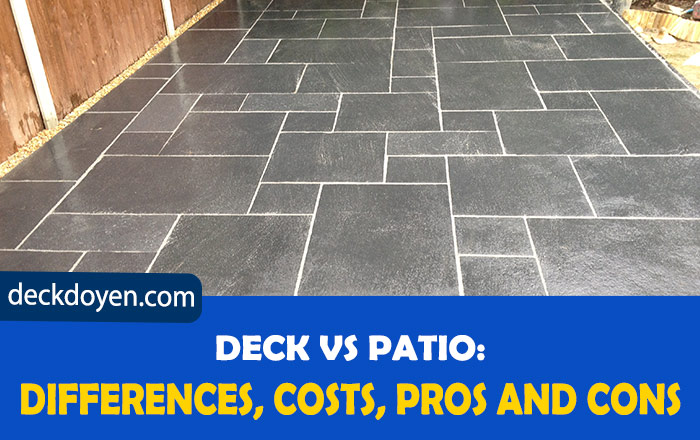To enhance the outlook of your property, Deck and Patio are the foremost preferences. They provide a whole new dimension to your living space by adding the element of appeal, functionality, and fun.
But with tons of choices available for open-air spots, and as the spectrum gets wide, it can get confusing to stick with one option. Thus, it’s best to weigh the differences according to your requirements. And which one to go with, Deck Vs. Patio?
A deck is an outdoor structure high above the ground, capable of supporting weight, and mainly composed of wood or composite material. A patio is a paved area closer to the ground and can be made of concrete, stone, or pavers. Decks can be more expensive than patios but provide good resale value. Patios are cheap, do not need a permit, and require minimal upkeep.
If you plan to renovate your home’s exterior to enjoy the warm, sunny weather, installing a deck or patio might be the way to go. But, like all other building projects, this might require prior homework and consideration to reach a result. This article discusses the pros and cons of decks and patios so you can quickly figure out your ideal pick.
What Makes A Deck Different From Patio?
Before making any new changes to your property and investing in an outdoor space, you might want to know about all the different choices. As this one decision can increase or decrease your property value, it must be carefully thought about and researched. The two popular picks that many homeowners prefer these days are decks and patios.
It can sometimes get confusing to tell the two apart as they have few striking similarities. Both are a perfect addition to outdoor living because these open-air spaces provide a relaxing and entertainment spot for you to enjoy and make memories. However, decks and patios are different in performance, location, building material, costs, and aesthetic value.
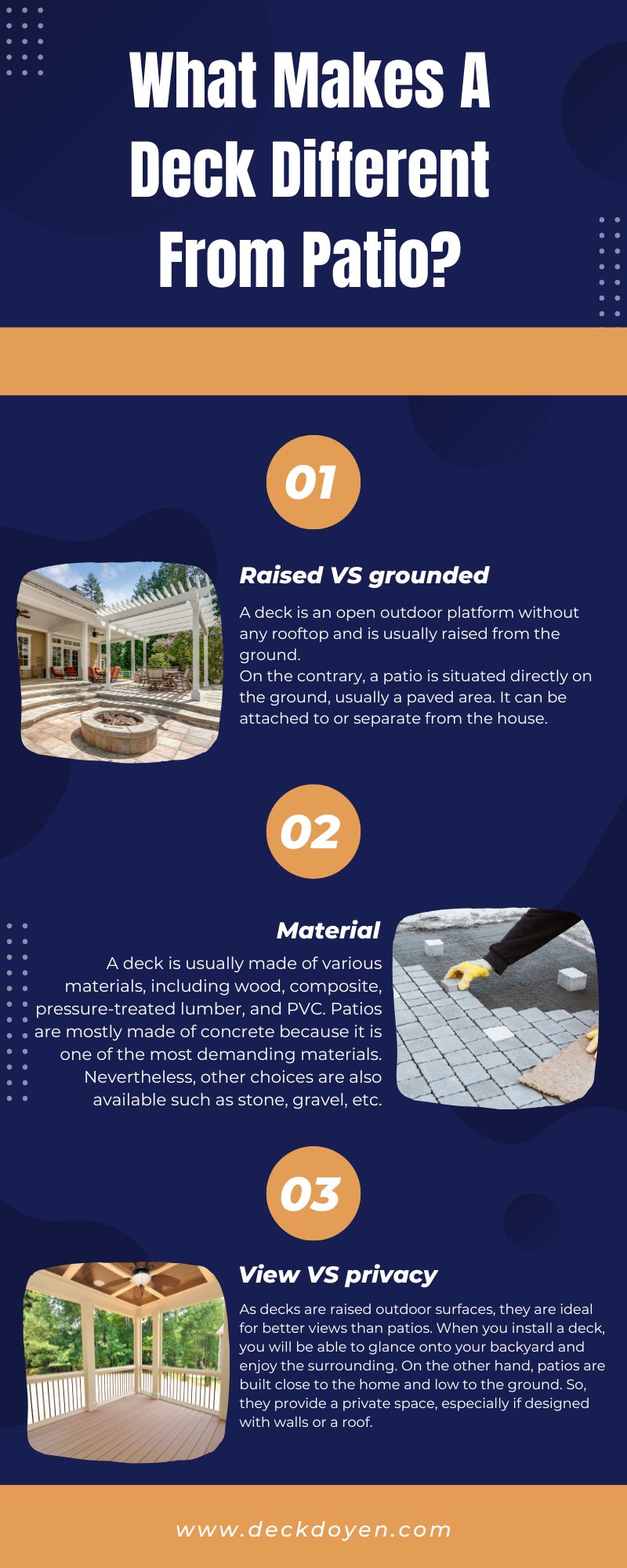
A. Raised VS Grounded:
A deck is an open outdoor platform without any rooftop and is usually raised from the ground. Usually, a deck is directly attached to the property. As it sits high above the ground, you can access it through a staircase. Also, you have two deck choices, including elevated and ground-level decks.
On the contrary, a patio is situated directly on the ground, usually a paved area. It can be attached to or separate from the house. Thus it becomes necessary to build it on the leveled land as it requires sitting on a flat surface.
B. Material:
A deck is usually made of various materials, including wood, composite, pressure-treated lumber, and PVC. Patios are mostly made of concrete because it is one of the most demanding materials. Nevertheless, other choices such as stone, gravel, etc are also available.
C. View VS Privacy:
As decks are raised outdoor surfaces, they are ideal for better views than patios. When you install a deck, you can glance into your backyard and enjoy the surrounding. On the other hand, patios are built close to the home and low to the ground. So, they provide a private space, especially if designed with walls or a roof.
Also Read: Should You Install Deck Posts in Concrete or On Top?
The Pros And Cons Of Decks And Patios:
Now that you know some of the main differences between a deck and a patio, you might want to investigate which option is more suitable for your property. I have listed the pros and cons of both these outdoor spaces so you can make the correct decision and give your home the makeover it eagerly awaits.
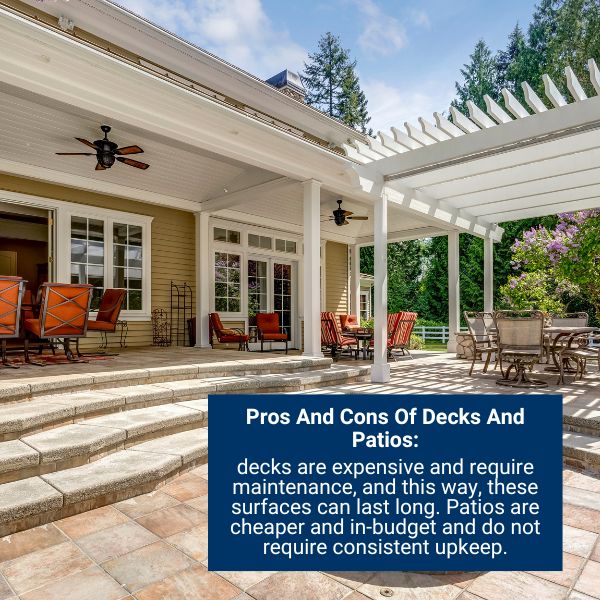
Terrain Considerations:
One of the advantages of installing a deck is that it can be built on uneven surfaces due to being elevated. Although they demand hiring professional and labor workers, all the efforts are worth it. You can transform any open space and utilize it for your good.
Patios are tricky to build on uneven land as they are constructed directly on the ground. As they require a flat surface underneath, installing it would mean doing extra prep work to level the ground, especially if you live in a hilly region.
Maintenance Requirements:
The most common material used for decking is wood. And, it might demand constant upkeep in the form of a power wash and repainting after regular intervals.
It can sometimes also be costly, but the maintenance level can vary depending on the material you choose. For instance, wood composite decks require almost minimal to no maintenance and last longer than their wood counterparts.
Patios made of concrete, pavers, or brick are comparatively durable and long-lasting. They do not need much upkeep, but you’ll still have to treat the soil beneath the patio. It will prevent cracking or splitting, especially if you live in an area prone to extreme weather.
Lifestyle Considerations:
As decks are built a little higher from the surface, it will give you a better view from the increased height. It makes them ideal for places with attractive surroundings so that you can enjoy the scene with your family and friends.
However, due to the elevation, they require railings for safety purposes. Thus, it can add to the cost and make an elevated deck even more expensive.
On the opposite, patios might not be able to provide a great view as they are closer to the ground. Nevertheless, they are great if you want an outdoor space with a sense of privacy. You can transform it into an enclosed space with walls and a roof to further secure it.
Also Read: Deck VS Terrace
Longevity:
Wooden decks are vulnerable to damage as they are less resistant to weather changes, giving them a shorter life span. However, by regular washing and cleaning, you might be successful in making them last longer. A wooden deck might last for about ten to twenty years with yearly maintenance and upkeep. Patios can remain intact for as long as thirty years if you maintain them well.
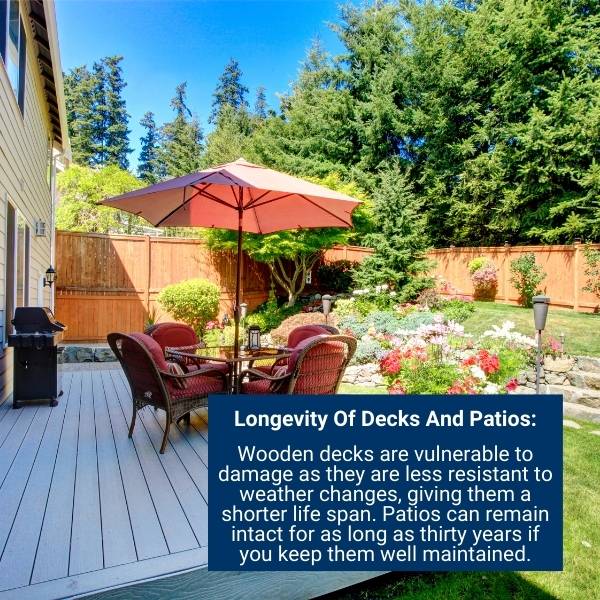
They do not need frequent power washing, but you might have to give them a clean to remove leaves and other debris from their surface for a clean and attractive spot for your leisure time.
Well-maintained composite decks can give tough competition to patios in terms of longevity. They can stand the test of time for twenty to thirty years.
Also Read: Can You Install Composite Decking In The Winter
Budget-Friendly:
Patios are the less expensive and budget-friendly option, great for individuals searching for a cost-effective alternative to a deck. Even if you opt for the more expensive patio materials like brick or flagstone, they will still be much less in pricing than decks.
These building materials are cheaper in comparison. Besides, they are installed flush with the ground, demanding less labor to build stairs, railings, install joists, and other elements necessary for decks.
In addition, patios also do not require permits and inspections, unlike decks. Thus, you do not have to worry about paying a fine if you do not follow the guidelines. For decks, you might have to remove the whole setup, and it will multiply the overall costs.
Also Read: Cheapest Ways To Build A Deck In 2022
Installation Time:
Some areas require a permit before constructing a deck, which can ultimately delay the whole process, and you might have to wait a while. On the flip side, patios usually do not require a permit. But still, it is better to get in contact with your local building official for confirmation.
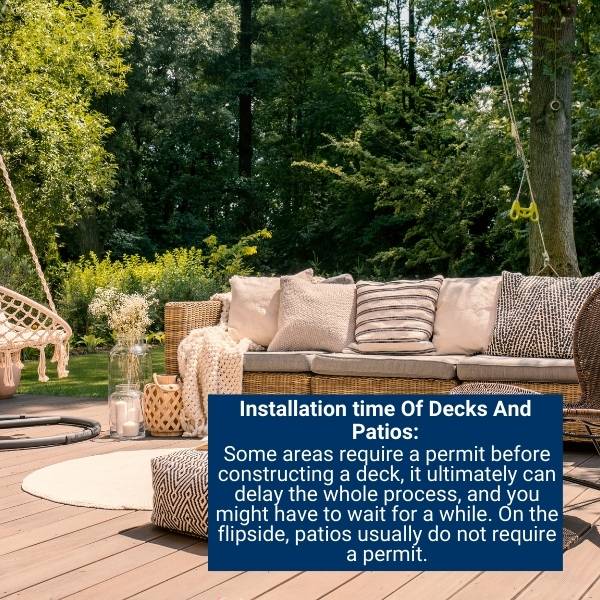
Even if the patio does not need a permit, it may require prepping the ground as it cannot be constructed on an unleveled surface. It is especially true for concrete patios that demand a lot of ground preparation before transferring the concrete.
Also Read: How to Prepare the Ground Under Deck in 7 Steps?
Role In Resale Value:
While decks would require a heavy initial investment, they can turn out to be beneficial and favoring for the property. The reason is that decks add an aesthetic appeal to the home and increase the resale value much more than patios. These elevated structures can become a great selling point for potential clients, so it is a smart way to maximize your return on the initial investment.
Patios are less expensive to construct, but also their resale value is lower than decks. Thus, before choosing any of them, you must decide based on the plan of selling your property soon.
Cost Estimates Of Building A Deck Or Patio:
The overall cost to build either a deck or patio outdoor structure depends mainly on two factors that are size and materials used. On average, decks cost about seven thousand dollars to construct and around thirty-five dollars per square foot for installation. Similarly, wood material is the most popular choice for decks that will further increase the price range. It can cost three to twenty-five dollars per square foot.
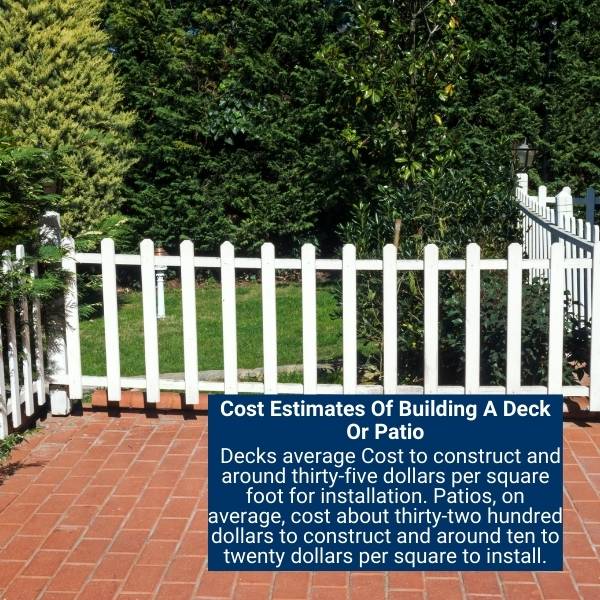
Decks may also require yearly maintenance and upkeep, adding to the expenses. However, a good alternative can be composite decks that might cost more than wood, but their aftercare is almost zero.
Patios, on average, cost about thirty-two hundred dollars to construct and around ten to twenty dollars per square to install. Furthermore, the material can cost somewhere around $1.50-$30 per square foot. Thus, there is a significant difference between the cost of installing a deck and patio.
Also Read: What to Put Under the Deck for Moisture? 6 Different Options
Conclusion:
Decks and patios are a great way of adding an element of excitement to your outdoor space. But, it can be challenging to decide which one will best suit your lifestyle, budget, and needs. Decks are elevated structures that add aesthetic appeal to your home and give you a better view. The use of natural wood as the material will enhance the overall look, and you’ll love spending some quality time in this outdoor space.
However, decks are expensive and require maintenance, so these surfaces can last long. The varying weather conditions might cause damage to the wood surface, which means more replacement costs. But, despite being a pricy investment plan, decks add value to your property and attract many buyers.
Patios are cheaper and in-budget and do not require consistent upkeep. Once they get a regular cleanup and sealing, they can last for many years. Also, they offer more privacy, and you can install them without any permit, unlike decks. As they are grounded structures, it requires an even surface for building. Apart from the initial prep work, patios are an economical option. But, they might not add much value to the home.
FAQs:
What Is The Cheapest Way To Build A Patio?
Concrete is considered one of the most popular and budget-friendly materials that you can use for installing a hard-surface patio. The other components as its part can be stone, gravel, sand, or shells, and they are mixed with water to form a paste. Once it dries, it creates a sturdy and durable surface that remains intact for decades.
Does Trex Decking Increase Home Value?
Trex decks are usually more on the pricy rice side than composite decks if you want to install them. But, they can be successful in raising the value of the property. Trex decks have many great qualities, such as being environmentally friendly, maintenance-free, and easier to install. Due to these reasons, the return on investment value, in this case, is much higher than composite decks.
Also Read: Can You Install Trex Decking In The Winter
What Is A Good Size Deck?
Most expert builders advise that the deck should be no longer than twenty percent of the house’s square footage. It is crucial because the deck must not overshadow the property visually; everything should look balanced and well put together. However, it is up to you to decide how large or small you want the outdoor space.
How Often Should You Seal A Patio?
A patio requires sealing every three to five years as a general rule of thumb. This span can be more or less depending on various factors, including how often you clean it, sun exposure, rain, and other weather situations. Also, once you seal the surface, you cannot remove it. So, you must be careful with it.

